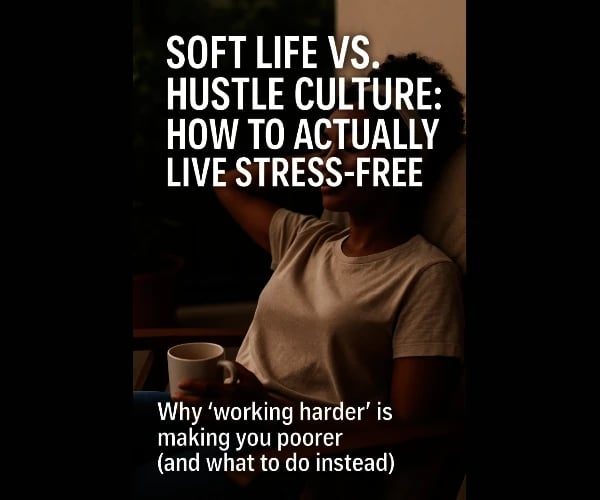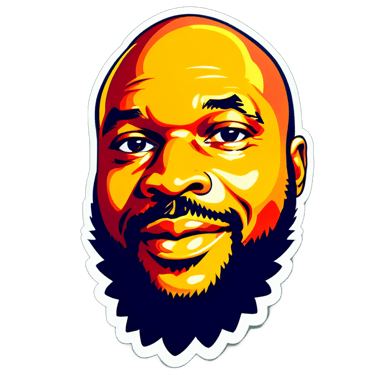Soft Life vs. Hustle Culture: How to Actually Live Stress-Free
Discover the truth about soft life vs. hustle culture and learn how to live stress-free without sacrificing success. Ditch burnout, embrace balance, and boost productivity the smart way. Read now!
PRODUCTIVITY & FOCUS
E.O. Francis
7/15/20255 min read


Why 'working harder' is making you poorer (and what to do instead).
The debate between soft life vs. hustle culture is reaching a tipping point. More people are waking up to the truth that constant grinding leads to burnout rather than success. A stress-free life built on balance is proving to be the real path to happiness and sustainable wealth. If you're exhausted from the endless hustle, this guide will reveal a better approach - one that values well-being as much as achievement.
Understanding Hustle Culture and Its Hidden Costs
Hustle culture has become a modern epidemic, promoting the dangerous idea that success requires nonstop work. It glorifies sleep deprivation, skipped meals, and abandoned relationships as necessary sacrifices. Social media feeds are flooded with entrepreneurs boasting about their 80-hour workweeks and all-nighters.
But the data tells a different story. Studies from Stanford University show productivity sharply declines after 50 hours of work per week. The World Health Organization has classified workplace burnout as an occupational phenomenon. Neuroscience research confirms chronic stress literally shrinks the prefrontal cortex - the part of your brain responsible for decision making and emotional regulation.
The biggest lie of hustle culture? That exhaustion equals dedication. In reality, overwork leads to:
Diminished cognitive function
Strained personal relationships
Increased risk of serious health conditions
Poor decision making from mental fatigue
Creative blocks and stagnant growth
The Rise of the Soft Life Philosophy
The soft life movement offers a radical alternative to constant striving. This isn't about laziness or giving up on ambition. It's about creating sustainable success through:
1. Intentional Rest
Prioritizing sleep, vacations, and downtime as essential components of success rather than signs of weakness.
2. Strategic Work
Focusing on high-impact activities that move the needle rather than busywork that burns you out.
3. Emotional Wealth
Valuing peace of mind, fulfilling relationships, and personal wellbeing as much as financial gain.
People embracing this approach report higher energy levels, better mental clarity, and ironically - often see their income increase. By rejecting the false choice between success and sanity, they're proving you can thrive without destroying yourself in the process.
Why the "Grind Mentality" Backfires
Hustle culture operates on several dangerous myths that keep people trapped in cycles of exhaustion:
Myth 1: More Hours = More Success
Research from the OECD shows countries with shorter workweeks often have higher productivity. Germany averages 1,356 hours annually compared to America's 1,757, yet maintains stronger economic output per hour worked.
Myth 2: Suffering Builds Character
While challenges can foster growth, unnecessary struggle wastes energy. Every minute spent on inefficient work is time stolen from strategic thinking, skill development, or restorative rest.
Myth 3: Busyness Equals Importance
The reality? Urgency is often manufactured. True priorities become clear when you step off the treadmill. Many "emergencies" disappear when given space.
Practical Steps to Transition to a Soft Life
Making this shift requires both mindset changes and concrete actions:
1. Redefine Your Relationship With Productivity
Audit your tasks using the 80/20 rule (what 20% of efforts drive 80% of results?)
Implement "deep work" blocks for focused creation
Schedule white space between meetings and tasks
2. Establish Non-Negotiable Boundaries
Set clear work/life separation (physical and digital)
Learn to say no without guilt
Protect your mornings or evenings for personal time
3. Optimize for Energy Over Time
Track your ultradian rhythms (90-120 minute focus cycles)
Take real lunch breaks away from screens
Incorporate movement breaks every hour
4. Build Passive Income Streams
Develop digital products or content that earns while you sleep
Invest in income-generating assets
Automate or delegate repetitive tasks
5. Cultivate a Restorative Routine
Prioritize 7-9 hours of quality sleep
Practice daily mindfulness (even 5 minutes helps)
Schedule regular digital detox periods
The Psychological Shift Required
Adopting a soft life isn't just about changing habits - it requires dismantling deep-seated beliefs:
From Scarcity to Abundance
Hustle culture thrives on fear - of missing out, falling behind, or not having enough. The soft life operates from trust that there's enough time, enough opportunity, and enough resources when you approach them strategically.
From External to Internal Validation
When you stop chasing arbitrary metrics of success (likes, titles, busyness), you can focus on what truly matters to you. This might mean:
Defining success on your own terms
Measuring progress by fulfillment rather than fatigue
Valuing sustainability over speed
From Either/Or to Both/And Thinking
The false choice between success and sanity keeps people trapped. The soft life proves you can have:
Achievement AND wellbeing
Productivity AND peace
Ambition AND rest
Real-World Examples of Soft Life Success
Case Study 1: The 4-Hour Workweek
Tim Ferriss popularized the concept of lifestyle design, proving how strategic automation and delegation could maintain (or increase) income while radically reducing work hours.
Case Study 2: Nordic Work Models
Countries like Denmark and Sweden consistently rank highest in both productivity and life satisfaction by prioritizing work-life balance through policies like:
6-hour workday experiments
Generous parental leave
Mandatory vacation time
Case Study 3: Digital Nomad Movement
Location-independent professionals are proving you don't need a traditional office grind to build successful careers. By leveraging technology, they're creating lives that blend work, travel, and personal fulfillment.
Overcoming Common Roadblocks
Transitioning away from hustle mentality isn't always smooth. Here's how to handle challenges:
Guilt About Resting
Remind yourself that rest isn't reward for work - it's part of the work. Just as athletes need recovery days, your brain needs downtime to consolidate learning and spark creativity.
Fear of Falling Behind
The people who appear ahead are often just burning out faster. Sustainable progress beats short-term sprints. Track meaningful metrics (energy levels, life satisfaction) alongside traditional success markers.
External Pressure
You'll inevitably encounter people who don't understand your choices. Prepare simple responses like:
"I've found I do my best work when well-rested."
"This schedule allows me to show up fully when it matters."
"I'm playing the long game."
Your Personalized Soft Life Blueprint
Take these steps to design your ideal balanced life:
Define Your Non-Negotiables
What must be present (or absent) for you to feel fulfilled? List 3-5 core requirements.Conduct a Time Audit
Track your activities for a week. Categorize them as:
High-value (aligns with goals/values)
Neutral (necessary maintenance)
Draining (could be eliminated or delegated)
Design Your Ideal Week
Block time for:
Deep work
Administrative tasks
Personal time
Buffer space
Implement Support Systems
What tools, people, or processes could make your life easier? Consider:
Automation software
Virtual assistants
Meal delivery services
Create a Maintenance Plan
Schedule quarterly reviews to assess what's working and adjust as needed.
The Future of Work and Wellbeing
As awareness grows about the costs of chronic overwork, we're seeing:
Corporate Shifts
Results-only work environments (ROWE)
Unlimited PTO policies
Four-day workweek trials
Technological Enablers
AI tools handling repetitive tasks
Remote collaboration platforms
Digital wellness apps
Cultural Changes
Destigmatizing rest and therapy
Celebrating efficiency over hours logged
Redefining success holistically
Final Thoughts: Your Invitation to a Better Way
The soft life isn't about doing less - it's about doing what matters with intention and ease. By rejecting the false promises of hustle culture, you're not giving up on success. You're claiming a version of success that doesn't require sacrificing your health, relationships, or joy.
Ready to make the shift? Start today by:
Identifying one hustle culture belief to release
Implementing one soft life practice
Sharing this perspective with someone who needs it
The most revolutionary act might simply be giving yourself permission to thrive without burning out. Will you take it?
